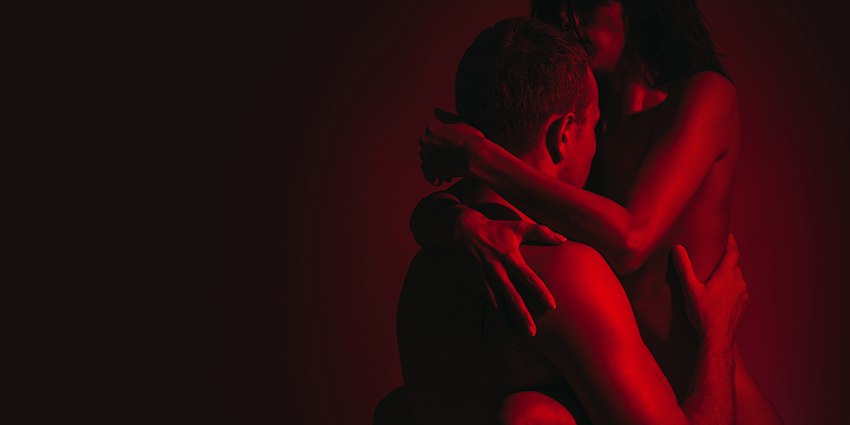Tiktok is one of the largest social media platforms with over 1 billion monthly users. The app’s popularity can be widely attributed to its unique algorithm that quickly picks up on what the users like and want to see on their For You pages.
Due to TikTok’s algorithm being so accurate, it’s very easy for people to find like-minded people and form small communities with those who share similar interests. One of those communities that had a massive impact on people has been the sex community on TikTok or so-called SexTox.
What is SexTok?
If that’s the first time you hear this term, you’re not alone! The sex community on TikTok, aka SexTok, is a community of people on the app who share their sexual experiences, educate others on sex, give juicy sex tips to try with your partner, and talk openly about their kinks.
People like Louise Red and Tiffany Nacke identify as sex educators who want to bring awareness to all the taboo topics and help people understand kinks better. Even doctors like Dr. Staci Tanaouye and Dr. Nicole Alicia, who create educational TikToks about sex and sexual health, are a part of the community.
But Wait… Isn’t TikTok an App for Teenagers?
Initially, TikTok (previously Musica.ly) was known as the app for teenagers and anyone under the age of 18, with D’Amelio sisters and many other young TikTok stars making the app popular. However, as the popularity of TikTok grew, so did the age of the app’s audience. Recent data shows that only 25% of TikTok’s audience is teenagers. So, while most of the app’s audience is young compared to other social media apps like FaceBook or Twitter, TikTok is not an app reserved solely for kids and lip-syncing videos.
A Perfect Place for Sex-Ed
With sex education being poor quality or completely unavailable in most schools in America and other countries globally, OB-GYNs have moved to TikTok to educate young people about their bodies and sexual wellness. Dr. Staci Tanaouye is sharing unfiltered advice about sexual health, breaking the myths of vaginas needing to smell like flowers and looking like the ones we see in porn.
Dr. Tanaouye built her platform on educating people about their bodies, and you can find a lot of information on topics like periods, contraception, and abortions on her profile. Her TikTok account is a place where people of all ages can go and find answers to questions you might not be comfortable asking your doctor for fear of judgment. Another doctor Nicole Alicia spends a lot of time creating videos that are aimed to help young girls and women conquer their fear about going to their OB-GYN for checkups. When you read the comments under the video explaining that OB-GYN’s don’t care whether you shave or wax before pap smear, you can quickly see that it does help women feel more comfortable, with one user commenting: “This made me feel so much better!”
Breaking Stigma Around Talking About Sex
Doctors and OB-GYN’s are not the only part of the SexTok community. Hashtag #sexeducation has over 677 million views on TikTok. And if you look at the top five videos, you’re going to see that they’re not from the popular Netflix show everyone is crazy about at the moment, but of people sharing their sex tips. One of the most popular videos under the hashtag are from Nurse Ria, an Only Fans creator, who shares videos about sex facts and tips.
One of her sex tip videos about pressing down on a woman’s lower stomach during penetration to increase pleasure gathered millions of views and got the whole app talking about if the sex tip actually works. It even attracted media attention as a new pleasure technique that nobody talked about before. This just goes to show how impactful the sex community on TikTok is.
Many queer sex educators on the platform also create videos sharing their experience and expertise on dating, periods, STI’s, and sex tips. For example, one of the educators, Katie Haan, recently talked about her favorite sex-related item, Lorals underwear, designed to enjoy oral sex during periods. In her video, Katie mentions that they can be great for people who want to receive oral sex but are self-conscious about it. “Now we know we don’t have to be self-conscious about the way we smell and taste, but if you’re on a journey to get it out of your head thinking that way, Lorals can be a great stepping stone,” Katie tells her audience.
Another queer sex educator Femme Pretender has a series where she talks about the different types of harnesses and how to choose one that works for you the best. People interested in trying out new things or only discovering their sexuality have a place to go and learn because creators like Katie Haan and Femme Pretender have created a safe space on the platform.
A New Space to Share Kinks
Together with sex-ed and sex tips on TikTok comes the kink community. You don’t have to go to Reddit and scour the depths of the forums and different subreddits to find people who have the same kinks you do. Instead, TikTok brings you like-minded people straight to your For You page.
It’s super easy to find people who enjoy things like BDMS, degradation, praise kinks, consensual non-consent, and so much more on the app. Some accounts use comedy, some are dedicated to creating the BDSM fantasy, and some creators have built their profiles discussing kinky things they enjoy. Like Tiffany Nacke, a 29-year-old dom creating content for people interested in BDSM.
On her page, she discusses various things that come with being involved in BDSM play and being a dom, like getting verbal consent during a scene. With her informative videos, she has amassed a large audience of almost 50 thousand followers, showing that there is a demand for kink communities. However, with all the wonderful things the sex community on TikTok has to offer also comes not-so-wonderful things.
From Kink-Shaming to Vanilla-Shaming
With the rise of kink-sharing and people on TikTok being more open about their kinky sex behaviors also comes the negative side. Unfortunately, many people still kink-shame other people and call them out on their “weird” sexual preferences. Because everyone has a voice on social media, everyone thinks they should use it. Now, kink-shaming has been around for a long time, and most of it is due to the old-school prejudice beliefs of people who enjoy whips and chains during sex and the lack of sexual education on why we have the kinks that we have and how our sexual fantasies work.
However, the more recent phenomenon that’s been happening, especially on TikTok, is vanilla-shaming. Yes, you’ve read it right – people are shaming others for not wanting to participate in kinky activities in the bedroom and choosing to have the “boring” type of intimacy. The vanilla-shaming is also most prominent against women. Young women are shamed for wanting to make love without being chocked or degraded and being labeled as boring because of it. They’re called “prudes” and “frigid” just because they refuse to consent to rough sex, and most often, people criticize them for not knowing how to have fun.
Women are already scrutinized enough in the media and IRL when it comes to sex. And vanilla-shaming women who are not into rough sex is nothing new. There has always been much shame and judgment whether a woman chooses to have sex or not, how they choose to have it and how they talk or don’t talk about it. However, the sex community on TikTok is taking the dangers of vanilla-shaming women to the next level because it’s targeted towards the youngest generation Z. TikTok provides a new place for the younger generation to romanticize and glamorize violence against women during sex. In 2020 TikTok was forced to remove videos from the “365 Days” trend due to people posting themselves bruised after rough sex with their partner.
In one video, a girl shares her heavily bruised body after watching the movie “365 Days” with her boyfriend, leading to them having rough sex. That video has millions of views and invites the younger generation to romanticize sexual violence as something that should be “couple goals.” This is problematic because data shows that even 38% of women in the UK report that they have been spat on, choked, slapped, and gagged during sex without consent. Because it is trendy and “cool” to be into rough sex, women have to deal with their sexual partners expecting them to be okay with rough sex activities.
Despite the new wave of vanilla-shaming, women are talking about their dangerous sex experiences and are standing up to stop the romanticization of sexual violence and vanilla-shaming on social media platforms like TikTok. Young women are encouraging conversations over on TikTok that call out the toxic sexual behavior towards women. And organizations like We Can’t Consent To This are working hard to raise awareness and demand justice for women.

